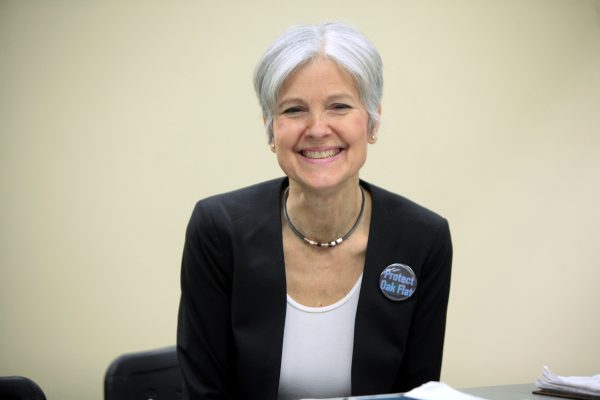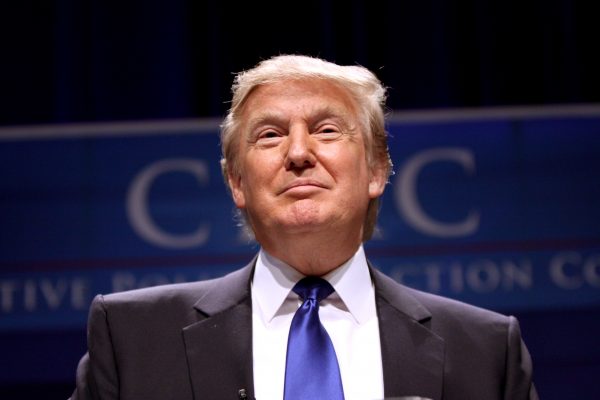On the Issues: Final Thoughts
November 4, 2016
Throughout this semester, we have analyzed the four main candidates of the 2016 Presidential Election (Clinton, Trump, Stein and Johnson) on individual issues relevant to the Fordham community. As the election season winds to a close, the time has come to judge each candidate based on their record, temperment, and positions in total. In this column, we deliver our final verdicts.
 Dr. Jill Stein, Green Party
Dr. Jill Stein, Green Party
McCullough:
For months, Stein has faced an onslaught of criticism from both the centrist and right-wing press. Most egregious has been the accusation of her being “anti-vaxx,” despite her numerous assertions to the contrary and her status as a practicing physician and a graduate of Harvard Medical School.
One very real issue is that Stein’s plans are rarely spelled out extensively. She promises to protect the social safety net and introduce a real system of public, universal healthcare—both very necessary steps that no other major party candidate can be trusted to take. However, she does not explain her specifics, weakening what would be a strong moral stance against a status quo that does not work for the people or for the planet.
Despite her shortcomings, she remains the strongest candidate in terms of protecting social services, limiting American intervention abroad, and ending the “racist drug war.” Stein would be a risky vote in a swing state, but might be a respectable choice for blue-state and red-state progressives with a distaste for Clinton’s hawkish record.
Moore:
As one of the two medical doctors to take the stage, she has certainly fared better than Republican primary candidate Ben Carson. Much like Johnson though, the two party mindset of the nation has not given her a proper seat at the debates. She takes activism to the next level, with an arrest warrant issued against her in North Dakota for spray painting in protest of a pipeline and being escorted from the Hofstra University campus before one of the debates.
As with Johnson, Stein’s policies are overall non-specific and politically doubtful, but some of her ideas indicate good intention. For example, she wants to simplify the Affordable Care Act to a single-payer system and to revise policies to treat immigrants more humanely, though these require cross-party agreement which does not exist. Her stance on supporting free higher education is commendable, but she does not seem to have a solid plan for how exactly she plans to achieve this goal, other than the “magic” quantitative easing which she did not sufficiently explain in her campaign.

Hillary Clinton, Democratic Party
McCullough:
Despite the touting of Clinton as a “progressive who gets things done” her past record is anything but progressive. As Secretary of State, she exhibited support for intervention in Libya, and for a right-wing coup against the democratically-elected president of Honduras. As Senator, she voted for the War in Iraq, expressed support for a border fence and the deportation of undocumented immigrants. Even after accepting the addition of some left-wing measures to the 2016 platform as a compromise with the Sanders-supporting wing of her party, Forbes recently reported that she might still be considering a privatization of Social Security, which would destroy the most successful social program in American history.
However, either Clinton or Trump will almost definitely become the next President of the United States, and Clinton is the less odious of the two. If Clinton wins, we must hold her feet to the fire so that she might pursue progressive policies that favor women, people of color and the working class—and hold her accountable if/when she swings right.
Moore:
While I agreed with Bernie Sanders when he stated “I’m sick of hearing about those damn emails,” Clinton’s egregious mishandling of classified documents is inexcusable. Regardless of whether the FBI finds this to be a criminal offense in their latest probe, her image and reputation has certainly taken a hit. Clinton is undoubtedly the most experience of all of the candidates in government and would most likely run the most stable presidency, which is never something to underestimate.
Clinton’s stated policies are also the most substantial and reasonable of the four. For example, Clinton has a markedly better grasp on immigration policies with tenable solutions, looks to protect entitlement programs more than the other candidates and offers a refreshing take on workers’ rights and benefits. That withstanding, many of her policies will incur very high costs, including a $7.5 billion cost for state-run drug rehab and treatment programs and a $15 million dollar grant for her proposed Office of Immigrant Affairs.

Gary Johnson, Libertarian Party
McCullough:
For the voter with a strong distaste for both candidates, Gary Johnson seems very tempting. He seems to fit the bill of the very fashionable “fiscally conservative, socially liberal” trope.
While his stances on foreign intervention and the decriminalization of drugs are admirable, we cannot ignore the harsh implications of right-libertarianism.
Gary Johnson may want to legalize marijuana, but he also wants to privatize social security, slash important welfare programs, and implement a regressive flat tax that will shift the tax burden from the wealthy to the working class.
His record is similarly troubling; as Governor of New Mexico, Johnson implemented harsh spending cuts and attempted to privatize education through a voucher system.
In addition to these policies, Johnson has continually shown himself to be downright incompetent. His numerous “Aleppo moments” have not demonstrated in any way that he is ready to accept the office of President of the United States.
Moore:
If ever a third-party candidate was going to have a chance to contend, it would have been this election cycle. And yet, Johnson did not reach the level of support he needed to even have a place on stage at the presidential debates. Unsurprisingly, he is thus nowhere near either candidate in the latest polls. His seeming ignorance on the city of Aleppo certainly didn’t help his image. Johnson’s policies have maintained a characteristic vagueness throughout the election cycle which has greatly hindered his argument.
For those issues he does have a stance on, his positions are quite radical, which could be a reason why he does not have much appeal in the polls. He does offer some coherent discussion, for example in his hardline condemnation of the war on drugs, but loses credibility when advocating to legalize all drugs, per an interview with the New York Observer, which does not seem well thought out. He also plans to do away with Social Security in favor of a “private voluntary system” with no real detail.

Donald Trump, Republican Party
McCullough:
The Republican candidate for 2016 is both an anomaly in American politics and unsurprising. On one hand, the brashness and openness of his right-populist rhetoric is almost unprecedented in modern American politics. However, the authoritarian nationalist sentiment captured in his speeches and policies is a natural reaction to the right-ward shift of the Democratic Party on the part of a working class that lacks class consciousness and a conception of intersectionality.
When people view themselves as native-born Americans and as white before they view themselves as workers, they will not acknowledge their kinship with the Mexican immigrant or the Syrian refugee. They will instead work to further the interests of rich white men—such as Trump himself.
The election of Donald Trump as President of the United States would be a disastrous occurrence, as it would empower a fascistic, white nationalist fringe that has come to support him. An emboldened American far-right would be bad for everyone, but worst affected would be those most in need of social empowerment.
Moore:
When Donald Trump took the stage it appeared that the Republican party might have a veritable political outsider, but as we all know, Trump’s campaign has deteriorated into nothing more than a populist tantrum. Some of his highlights, or rather lowlights, include calling into question the integrity of the Khans’ son, countless horrible remarks about Muslims and Mexican immigrants, and quite recently, a whole host of recent sexual assault allegations.
Personal issues aside, some of Trump’s policies, such as his insistence not to cut social security and his personal belief in the legalization of medical marijuana, are substantiated, and he does offer some good financial reasoning against free higher education, even if you don’t agree with the policy. However, other positions, such as his belief that Mexico will build and pay for a wall and his promise to completely repeal the Affordable Care Act, do not point to a productive future. Making America great again as an act of restoration to whatever vision Trump maintains is impossible, since history can never exist in isolation.








